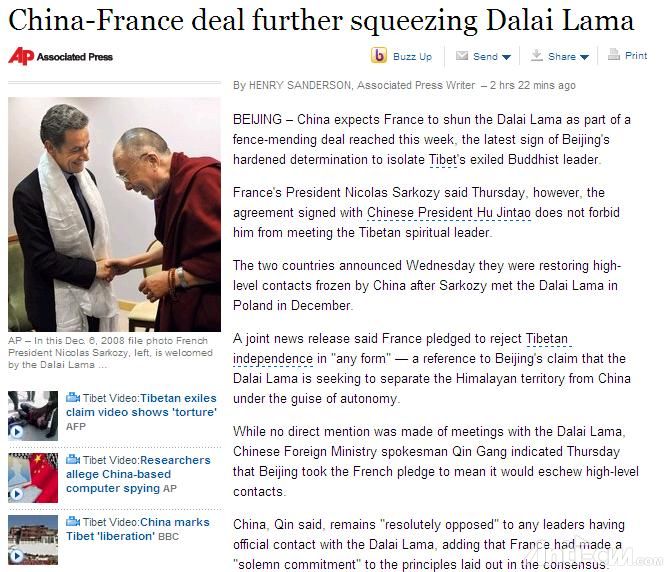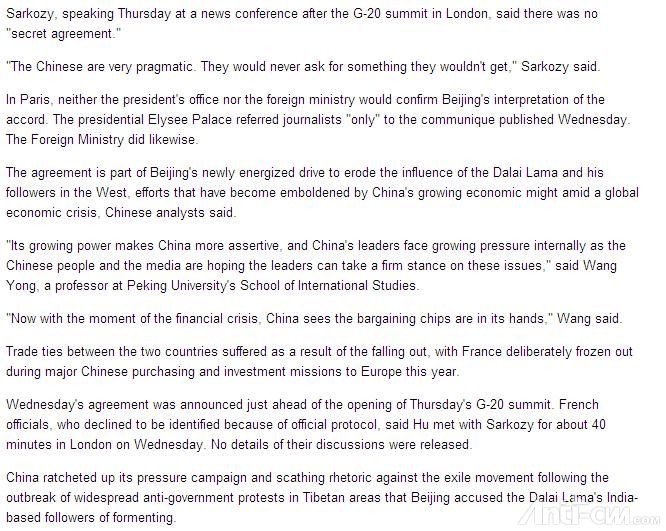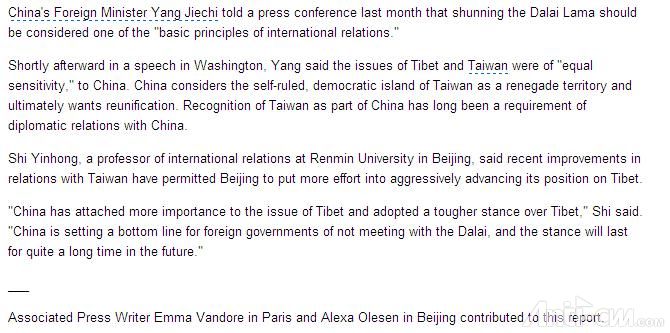|
|
本帖最后由 I'm_zhcn 于 2009-4-6 07:03 编辑
China-France deal further squeezing Dalai Lama
http://news.yahoo.com/s/ap/20090402/ap_on_re_as/as_china_france
By Associated Press Writer Henry Sanderson – 2 hrs 18 mins ago

In this Dec. 6, 2008 file photo French President Nicolas Sarkozy, left, is welcomed by the Dalai Lama in Gdansk, Poland. China on Thursday April 2, 2009 spelled out the terms of its fence-mending with France, saying it expects French leaders to shun the Dalai Lama. China and France announced Wednesday, April 1, they were restoring high-level contacts following a lengthy spat sparked by French President Nicolas Sarkozy's meeting with the exiled Buddhist leader. AP Photo/Eric Feferberg, File Thu Apr 2, 7:19 AM ET
BEIJING – China expects France to shun the Dalai Lama as part of a fence-mending deal reached this week, the latest sign of Beijing's hardened determination to isolate Tibet's exiled Buddhist leader.
The two countries announced Wednesday they were restoring high-level contacts frozen by China after French President Nicolas Sarkozy met with the Dalai Lama in Poland in December.
A joint news release said France pledged to reject Tibetan independence in "any form" — a reference to Beijing's claim that the Dalai Lama is seeking to separate the Himalayan territory from China under the guise of autonomy.
While no direct mention was made of meetings with the Dalai Lama, Chinese Foreign Ministry spokesman Qin Gang indicated Thursday that Beijing took the French pledge to mean it would eschew high-level contacts.
China, Qin said, remains "resolutely opposed" to any leaders having official contact with the Dalai Lama, adding that France had made a "solemn commitment" to the principles laid out in the consensus.
In Paris, neither the president's office nor the foreign ministry would confirm Beijing's interpretation of the accord. The presidential Elysee Palace referred journalists "only" to the communique published Wednesday. The Foreign Ministry did likewise.
France's apparent capitulation to Chinese pressure is part of Beijing's newly energized drive to erode the influence of the Dalai Lama and his followers in the West, efforts that have become emboldened by China's growing economic might amid a global economic crisis, Chinese analysts said.
"Its growing power makes China more assertive, and China's leaders face growing pressure internally as the Chinese people and the media are hoping the leaders can take a firm stance on these issues," said Wang Yong, a professor at Peking University's School of International Studies.
"Now with the moment of the financial crisis, China sees the bargaining chips are in its hands," Wang said.
Trade ties between the two countries suffered as a result of the falling out, with France deliberately frozen out during major Chinese purchasing and investment missions to Europe this year.
Wednesday's agreement was announced just ahead of the opening of Thursday's G-20 summit. French officials, who declined to be identified because of official protocol, said Chinese President Hu Jintao met with Sarkozy for about 40 minutes in London on Wednesday. No details of their discussions were released.
China ratcheted up its pressure campaign and scathing rhetoric against the exile movement following the outbreak of widespread anti-government protests in Tibetan areas that Beijing accused the Dalai Lama's India-based followers of formenting.
China's Foreign Minister Yang Jiechi told a press conference last month that shunning the Dalai Lama should be considered one of the "basic principles of international relations."
Shortly afterward in a speech in Washington, Yang said the issues of Tibet and Taiwan were of "equal sensitivity," to China. China considers the self-ruled, democratic island of Taiwan as a renegade territory and ultimately wants reunification. Recognition of Taiwan as part of China has long been a requirement of diplomatic relations with China.
Shi Yinhong, a professor of international relations at Renmin University in Beijing, said recent improvements in relations with Taiwan have permitted Beijing to put more effort into aggressively advancing its position on Tibet.
"China has attached more importance to the issue of Tibet and adopted a tougher stance over Tibet," Shi said. "China is setting a bottom line for foreign governments of not meeting with the Dalai, and the stance will last for quite a long time in the future."
Associated Press Writer Emma Vandore in Paris and Alexa Olesen in Beijing contributed to this report.



|
Dalai, deal, further, Lama, squeezing, Dalai, deal, further, Lama, squeezing, Dalai, deal, further, Lama, squeezing
评分
-
1
查看全部评分
-
|